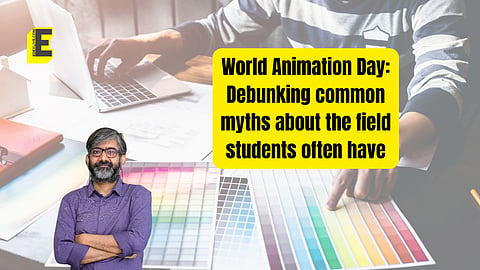

On World Animation Day, we celebrate the vibrant world of animation, a medium that captivates audiences of all ages.
For those considering a career in this dynamic field, it is vital to understand its scope, and diverse opportunities.
However, many aspiring animators may hold misconceptions about what the profession truly entails.
By debunking these myths, we can provide a clearer perspective on what it means to pursue a career in animation and help future students navigate their paths with confidence.
Common myths about animation:
1) It is only about drawing skills: While drawing skills are valuable, successful animation goes beyond that. It relies heavily on storytelling and the use of movement to convey meaning.
Animators must grasp the physics of motion, the nuances of spacing and timing, and other filmmaking skills, which can be developed through study and practice.
2) Animation is just about learning software like Maya or Blender: Software is merely a tool, not the essence of animation. Just as knowing MS Word doesn’t make you a novelist, mastering animation software alone won’t make you an animator or filmmaker.
A solid understanding of animation principles is vital, and the choice of software should be based on the specific needs of your project. Moreover, strong storytelling skills are essential for any animator.
3) Animation is only for kids: This is a misconception. Animation is a versatile medium used for various kinds of communication media and genres, including adult themes, political themes, advertising, education, communication design and art.
Moreover, animation can work without dialogue and is therefore more universal than live-action modes of storytelling and communication, which makes it reach a much wider audience.
Finally, animation is filmmaking, a superset of many disciplines, and involves most skills necessary for creating a live-action film and more.
4) Artificial Intelligence (AI) will take away our animation jobs: AI is only good for generic low-level jobs. Moreover, it can only reproduce content based on the data it is fed with, which incidentally is mostly from the first world.
Therefore, AI fails miserably when it comes to generating Indian content. A strong connection with your roots and accordingly developing your own style and skill sets would always outpace AI.
5) I love watching animation/anime, so I should pursue it as a career: Be careful with your choice, as animation is a tedious, highly demanding process, needs proficiency in technical and intellectual skills, requires extended hours of practice, attention to detail, and strong time management skills. However, it can be fun once mastered properly.
6) Animation education is solely about technical skills: It might appear that animation education is primarily to provide you with technical skills.
However, a well-designed and effective programme should include courses on narrative design, character development, understanding psychology and society, and understanding cinematic devices for audio-visual storytelling, which are more important than learning software tools or technical equipment.
It is more of a training in intellectual as well as techno-aesthetic skills.
7) The industry is saturated: While there is competition in the animation field, the demand for skilled animators, especially 2D animators continues to grow in various sectors, including gaming, film, advertising, and online content.
In truth, the possibilities of finding meaningful employment or work are immense if one can find their own visual style, aesthetic sophistication and storytelling skills.
8) All animation programmes are the same: Some think that all animation courses offer the same quality of education. However, the course syllabus can vary significantly between institutions. So, it is essential to research and choose a programme that fits your goals. If you want to be an animator or technician, you could look for courses that teach you technical skills.
However, in case you wish to become a filmmaker, illustrator or comic book artist and tell your own stories, research programs that teach storytelling alongside technical skills.
It is essential to understand that pursuing a career in animation requires a well-rounded grasp of both the technical and creative aspects of the field. By recognising and addressing common misconceptions, you can better prepare yourself for the journey ahead.
Whether you're drawn to storytelling, visual artistry, or technical execution, the animation industry offers diverse opportunities for those willing to develop their skills and find their unique voice. As you explore educational programs, seek out options that align with your aspirations and foster your growth as an artist.
With dedication and passion, you can forge a fulfilling path in this dynamic and ever-evolving field. Best of luck on your journey!
